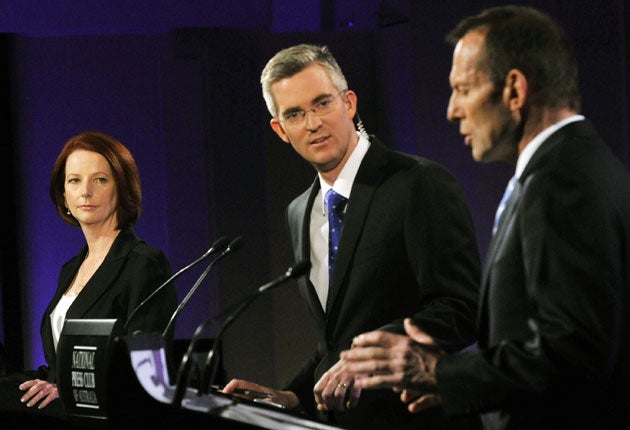Immigration a key issue in election debate contested by immigrants

In one corner, the Welsh-born Australian Prime Minister. In the other, her challenger: the London-born leader of the opposition. The touchstone topic in the country's only televised leadership debate: immigration. And they were both in favour of cutting it.
In what was heralded as a first for Australian politics – a national showdown between a female Prime Minister and her male opponent – Labor's Julia Gillard took on the Coalition's Tony Abbott in a Sunday night debate that fell short of a decisive victory for either.
The tone was set by Mr Abbot, a moral conservative, flagging a major cut in immigration numbers and pledging to turn back a rising tide of boat people. But with neither side landing a killer blow – in a country with a long history of such debates – it was left to Australia's commercial television channels, and their on-screen graphics, to declare the winner. The Nine Network's so-called "worms" – a blue line and a pink line controlled by a test audience of 150 – showed men and woman alike favouring Ms Gillard over Mr Abbott for most of the debate.
"The worm confirms that Tony Abbott has a problem with women, and there appears to be a gender gap with how people might vote," analyst Nick Economou, from Melbourne's Monash University, told Reuters.
Opinion polls suggest that Ms Gillard is on track to win the 21 August election, after she replaced fellow Labor politician Kevin Rudd as Prime Minister in a dramatic internal leadership challenge in late June.
While Ms Gillard during the debate defended the Labor Government's economic record, Mr Abbott labelled it a hopeless administration that had gone from bad to worse since the party sacked Mr Rudd five weeks ago.
Ms Gillard has always refused to comment on how her predecessor was deposed, though leaks have suggested she originally agreed to support him, only to renege on the deal when other party members revealed she had sufficient support to force him from office. One network's on-screen popularity tracker fell sharply when Ms Gillard refused to shed light on the circumstances surrounding the ousting.
Mr Abbott accused the Government of offering "clever politics, but [being] absolutely hopeless at running the country". Following up his announcement earlier in the day that a future Coalition government would cut Australia's annual migrant intake from 300,000 to 170,000, he challenged Ms Gillard to do the same. "We have nominated what we think is the right number for Australia going forward, and I challenge the Prime Minister to do likewise," he added.
But the Prime Minister insisted Labor had already reduced the immigration intake to a similar figure, with further cuts in the pipeline. "So the trick here, and I think that Tony should really reveal the trick, the trick here is Tony today has promised the Australian people what I'm already delivering to the Australian people," she said.
The difference over interpretation of numbers comes amid a much wider debate about Australia's future population levels. Around one in four Australians were born overseas, including the two leaders. With recent immigration as high as levels seen in the late Sixties, the country's population has hit 21.5 million. Most new migrants come from New Zealand, Britain, China and India. In the year to June 2009, 13.6 per cent came from the UK – a trend which could be stalled by a government crackdown on migrant numbers.
The Labor Government's forecast of a total population of more than 36 million by the year 2050 is at odds with Mr Abbott's view that it needs to be "a lot lower".
The two leaders also disagreed on how to tackle climate change.
Join our commenting forum
Join thought-provoking conversations, follow other Independent readers and see their replies
Comments
Bookmark popover
Removed from bookmarks